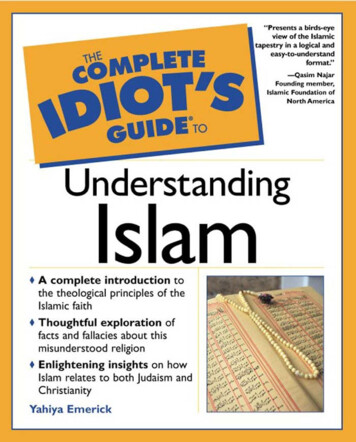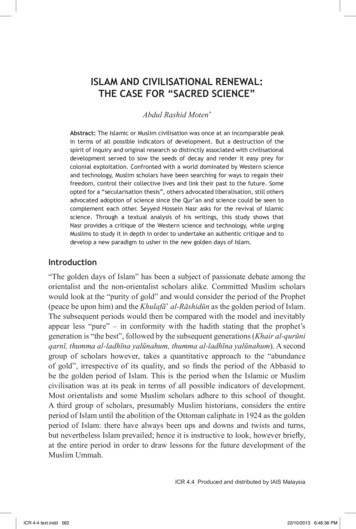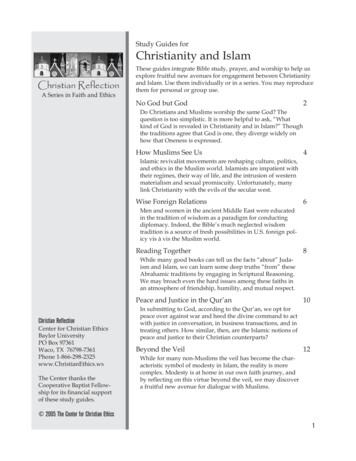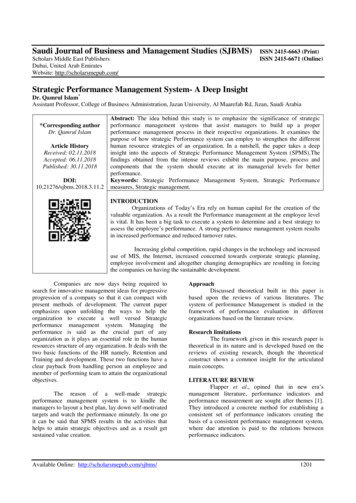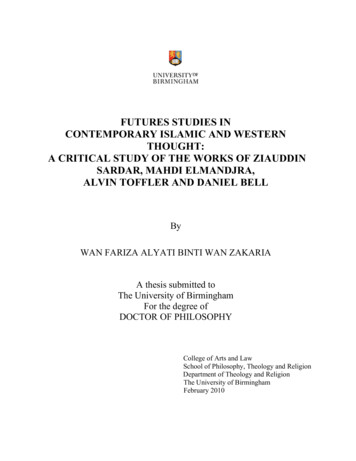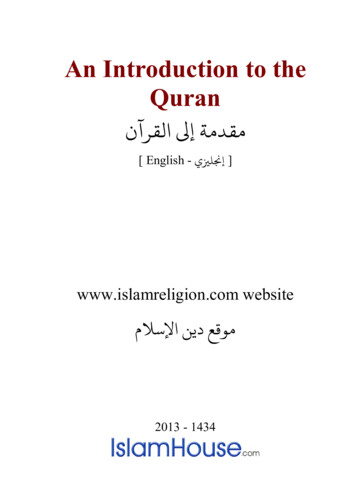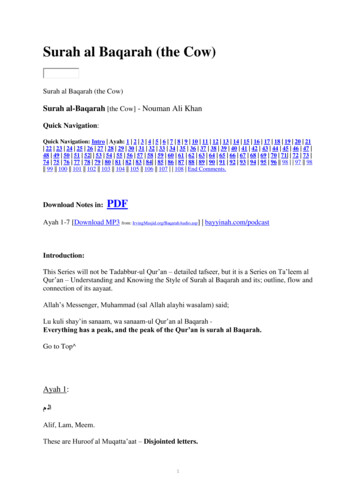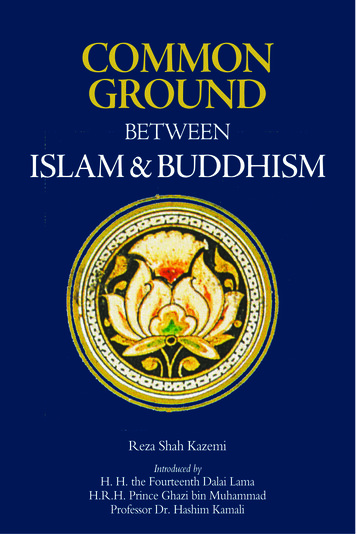
Transcription
Chapter1PrefaceIn this short preface, we intend to draw the attention of the readers to afew important points:(1) We are Muslims, but is it enough for us to be Muslims and shouldwe feel pride in it without knowing that Islam, more than anything else,stresses upon knowledge and action?Islam means knowledge of a specific conception of the cosmos for theintellectual and moral reform of mankind, of a superbly calculated program put forth as a dynamic school of thought. It is knowledge of articles of belief and articles of action.Unfortunately many people consider themselves to be Muslims simplybecause they were born in a Muslim family or in a Muslim country, orbecause it was Islam which came to their minds first and they acceptedit. However, it is obvious that a true Muslim cannot be content with suchthings, because Islam is not a thing to be received in inheritance, nor is ita product of environments.It is, therefore, necessary for a Muslim to have a true understanding ofIslam, both of its articles of belief and articles of action so as to be able togive a convincing answer, howsoever brief and simple, to the followingtwo questions:(i) What is Islam and how is it a blessing to humanity?(ii) Why have you accepted Islam?After learning the precepts and principles of Islam, it is equally necessary to apply them in one's individual and social life.2
(2) The book "Rationality of Islam" aims at a comprehensive presentation of the basic teachings of Islam in a concise form. Subjects dealt within lengthy chapters, in voluminous books, have sometimes beencrammed into a few lines. Anyhow, an effort has been made to presentfacts in a simple diction and yet to preserve the rational spirit of thebook.(3) It has also been our consistent effort that, in discussing doctrinesand tenets of Islam, the relevant authority should always be quoted andnothing should be mentioned without a proof. As for articles of action,reference has been made, as far as possible, to their instructional and social philosophy, so that the reader may be encouraged to act according tothem.(4) Though Qur'anic verses, sayings of the Holy Prophet and HolyImams have been extensively quoted, yet their Arabic texts have beenomitted for the sake of brevity and simplicity. Quotations from Westernscholars have been cited in only the first few chapters.It is hoped that this book will enlighten the minds of our conscientiousyoung men and women, and will serve as an introduction to a widerstudy of Islam. It will induce them to recognize Islam as a great and creative school of thought, help them in shaping out their lives and preparing them for great sacrifices. It will most certainly inspire the youngpeople to form a much better, healthier and happier society.The Publishers3
Chapter2Religion and Its Role in Human LifeTo understand what religion is and what is its role in the life of men, weshould first of all know its definition.Religion may briefly be defined as under:Religion (din) is an all-round movement in the light of faith in Allahand a sense of responsibility for the formation of thought and belief, forthe promotion of high principles of human morality for the establishment of good relations among members of the society and the elimination of every sort of undue discrimination.Keeping in view this definition, our need for religion and religiousteachings is absolutely clear. To be a little more elaborate, it may be saidthat we require religion for the following reasons:1. Sanction for the Principles of MoralityReligion provides a sanction for the principles of morality like justice,honesty, righteousness, brotherhood, equality, virtuousness, tolerance,sacrifice, help to the needy and other kindred virtues. These are the virtues without which, not only our life will lose its order and normalcy butit is very likely to be turned into a chaos. Of course, it is possible to acquire these moral and social qualities without the aid of religion. But certainly in the absence of firm religious belief, these values appear to losetheir meaning and become a series of mere unbinding recommendations,because in such a case they do not amount to more than a piece of advicefrom a close friend in respect of which we are at full liberty to accept orreject.4
These qualities are rather based on an internal feeling and faith andare naturally beyond the scope of ordinary law.It is only faith in the existence of an Eternal Being, who knows manequally from within and without and who has full control over him, thatcultivates these virtues within man and impels him to automatic righteousness and adherence to duty, and if need be, to make sacrifices forthe sake of others.The well-known philosopher-cum-historian, Will Durant says in hisbook, 'Pleasures of Philosophy' that, without the backing of religion,morality is nothing more than arithmomancy, as without it, the sense ofobligation disappears.2. Power to Endure Adversities of LifeReligion provides power for facing adversities and serves as a bulwarkagainst undesirable reactions of despair and hopelessness.A religious man, with firm belief in Allah, and of His munificence,does not find himself in utter desperation even in the worst moments ofhis life, because he knows well hat e is under the protection of a Beingwho is Almighty. With faith in the fact that every problem can be solvedand every deadlock can be resolved with His help, he can overcomeevery disappointment and hopelessness.For this very reason, it very seldom happens that a truly religious mansuffers from the acute reactions of desperation like suicide, nervousbreakdown or psychic ailments which are products of frustration anddefeatism.The Holy Quran says:"Surely those who are close to Allah, have no fear nor shall theygrieve." (Surah Younus, 10:62)Imam Ja'far Sadiq (A) says: "A true believer can never commitsuicide."5
Thus, religious faith is, on the one hand, a motivating force, and on theother, it is a factor which enables man to face hardships with courageand saves him from the ill effects of failure and disappointment.Following the downfall of the Nazis, says Bertrand Russell says thereexisted a danger of intellectual and ideological revolt in Germany, but nodoubt, religion has been one of the biggest factors in that country's return to stability.According to Dr. Durant, behavior of a man who is not blessed withreliance on religion suffers from special epicurean confusion, and the lifewhich has not the comforting support of religion, is an unbearableburden.3. Encounter with Ideological VacuumMan cannot live in an ideological vacuum for long and as such histendency towards a wrong ideology and false values becomes definite.His intellectual life is not filled with sound beliefs and healthy teachings.A superstitious and even destructive ideas may find way into his spiritual firmament and may for ever pollute his brain. Instances of man's tendency towards idolatry, man worship, diverse superstitions and credulityregarding the influence of irrational things over destiny, can be witnessed even in the lives of world intellectuals. All this originates fromspiritual vacuum. It is religion which can fill the ideological and intellectual vacuum with sound teachings and can save one from a tendency towards absurdities and irrationalities.Hence, true understanding of religion can play an important role incombating superstitions, though it is true that even religion itself, if notunderstood correctly, may promote superstitions.4. An Aid to the Progress of Science and KnowledgeReligion with its firm and sound teachings can be an effective factor inscientific progress, because its foundation has been laid on the solid bedrock of "freedom of will" and on the fact that everybody is accountablefor his own deeds.6
The Holy Quran says : "Everyone is entangled in the outcome of hisdeeds." (Surah al-Muddath-thir 74:38)Faith in religion teaches that limitless knowledge is the source of thiscosmos, which is like a very grand book penned by an erudite scholar.Every page of it, nay every line and every word of it, contains a glaringtruth which stimulates us to further study and contemplation.This attitude towards the cosmos undoubtedly stimulates persistentthinking over the mechanism of creation and consequently, helps in theadvancement of science and knowledge.In contrast, if we hold that this universe is the product of sheer mechanical factors having no intellect, there remains no plausible reason whywe should make strenuous efforts to discover its secrets. In principle, auniverse which is the outcome of the working of an unconscious machinery, can neither be well-designed nor mysterious.Apart from giving a deadly blow to the advancement of science andknowledge, such conception of cosmos negates the very fact that man'sinstinct is basically rooted in religion. Albert Einstein was very truewhen he pointed out why great thinkers and discoverers are all interested in religion. He said that it was hard to find anyone among the greatthinking brains of the world who might not have a sort of religious feeling peculiar to him. That feeling was different from the religion of theman in the street.It has the form of a delightful wonder at the marvelously accurate system of the universe, which from time to time, unveils secrets in comparison with which all organized human thinking and research are ratherweak and stale. This feeling illuminates the path of the life and efforts ofa scientist and as he gains success and honor, it keeps him free from thedeadweight of selfishness and pride.What a belief in the system of the universe and what a fascinating desire it was, he adds, that enabled Kepler and Newton to suffer for yearsin isolation and in complete silence in order to simplify and explain thelaws of gravitation and planetary motion! No doubt, it is this very religious feeling that enabled the self-sacrificing and self-effacing men7
through long centuries, in spite of their apparent defeats and failures, torise on their feet again and make fresh efforts.(The world as I see)The contemporary scientist, Abernethy, says that science for its ownperfection should regard faith in God as one of its accepted principles.Thus a religious man, following the true teachings of religion, can morethan anybody else, carry out research and discover the secrets of nature.Fight Against DiscriminationReligion strongly opposes every discrimination based on color, race orclass, because it regards all human beings as God's creatures and everycountry as God's country. According to it, all enjoy God's love and kindness equally and as such, all are equal.According to the teachings of Islam, no man can be superior to anotherman on the basis of his color, race, descent, language or class.Islam recognizes only piety and knowledge as the touch-stones of superiority .Allah says: "Man, we have created you from a male and a female, and we have divided you into nations and tribes, so that you mayget to know one another. Surely the most honorable of you in the sight ofAllah is he who is most pious."(Surah al- Hujurat, 49 :13)Thus the role of religion in a world that has not yet been able even tosolve the color problem, the question of class apart, is quite clear.Anyhow, it cannot be denied that every kind of religious thought orbelief cannot produce the de-sired results.Like every other intellectual movement, religion also requires correctguidance. Otherwise it assumes the form of superstition, monasticism,escape from positive life and pseudo-agnostic negative tendencies, theexamples of which can even now be seen in the West, where people havebecome fed up with a mechanical life. It is only in such an atmospherethat for want of correct knowledge, religion is regarded as an obstructivefactor.8
Roots of Religious SenseMan has been familiar with religion for such a long time that it coversthe entire recorded history of human life and goes back into the depthsof pre-historic times.The Holy Quran has described religion as man's innate nature andAllah's established order. It says : Islam is in harmony with nature whichAllah has designed for man. ( Surah al -Rum,30 : 30)Research carried out by sociologists and historians shows that placesof worship, either in their simple or elaborate and complex form, have always had an influence on human life, and religion in its various shapeshas been interwoven with its history .Dr. Durant, after a comparatively detailed discussion of atheism of certain people writes that despite all that he has mentioned, these are exceptional cases, and the old notion that "religion" is a phenomenon that generally extends to all human beings, is true. The question of religion in theview of a philosopher is one of the basic questions of history andpsychology.He adds that, from time immemorial, religion has always gone hand inhand with human history. The idea of piety can never be removed fromhuman heart. (History of Civilization vol .1, pp. 88- 89)From a psychological point of view, this time honored relationshipbetween man and religion proves that religious feeling is one of the basichuman instincts natural elements of the human soul.It is obvious, that at a time, when the level of human thinking was lowand the sciences had not made any remarkable progress, this internalfeeling was in an incredible way mixed with superstition, but graduallywith the progress of sciences on the one hand ,and persistent efforts andteachings of the prophets on the other, it was purified of adulterationsand it regained its purity and originality.Anti-Religious Waves During the Past CenturiesIn these circumstances it looks a little surprising that during the pastcenturies, especially from 16th Century onward, a violent anti-religiouswave has hit the Western countries and many of the liberal minded9
Europeans have dissociated themselves from the Church. Those whowanted to remain loyal to religion turned to some Eastern religions or toa sort of gnosticism minus religion, while a large number of people wereattracted by materialism and the like.But an inquiry into the roots of this subject indicates that in the specialcircumstances prevailing Europe, this phenomenon was notunexpected.Factors leading to anti-religious movements and tendency to materialism in Europe should be looked for in the perspective of the policywhich the Church pursued with regard to the Renaissance and progressof natural sciences in various fields.When the Church in the middle ages, especially during the 13th to15thcenturies started a campaign against science which continued even to the16th and l7th centuries and attempted to crush scientific movementsthrough Inquisition, issued a papal decree to condemn science draggedpeople like Galileo to persecution and forced them to deny the motion ofthe earth. It is obvious what the reaction of the scientists to such teachings could be. They, being at the cross roads of sciences and religion (ofcourse religion as it was understood at that time and in that environment), naturally went for science, the firm basis of which they had personally observed and tested.Mistake in analogy and incorrect comparison of other religions to thespecial position of the Churches in the middle ages induced certain scientists to start a campaign against all religions and to reject them formally. They went to the extent of innovating a doctrine known as discordbetween religion and science'.But the study of scientific movement in Islam, which started from thevery first century and bore fruit in the second and third centuries of theHegira era, shows that in Muslim society the case was quite different.This movement soon gave birth to the scientists like Hasan lbn Haitham,the well-known Muslim Physicist, Jabir lbn Hayyan. whom theEuropeans call Father of Chemistry, and tens of others like them. Theirbooks exercised considerable influence over the Scientists like Roger Bacon, Johann Kepler and Leonardo da vinci. It is interesting that all thisscientific progress took place in the middle ages and coincided with the10
Church's violent opposition to the Renaissance and the standard-bearersof the new scientific movement.All historians in the East and the West, who have dealt with Islamicculture, are unanimously of the view that it gave rise to a wide-spreadscientific movement whose influence over the Renaissance and the scientific movement of Europe was remarkable.Thus the factors which induced the liberal-minded in the West to dissociate themselves from religion, did not exist in the case of Islam. Onthe contrary, there were factors which worked in the opposite direction.In short Islamic movement had a special connection with World scientific movements, and for this very reason was the fountain-head of thevast development of sciences and knowledge.However it cannot be denied that disputes and dissensions among asection of Muslim people which in intensity from the fifth century (Hijra)onward, short-sightedness, non-realization of true teachings of Islam,apathy to progress and indifference to the spirit of the time, resulted inthe backwardness of many Muslim countries.Another factor which complicated the problem was that Islam in thereal sense was not introduced to the younger generation. Thus the constructive role of Islam in various fields gradually diminished. Now theposition is that many young men think that Islam has always been in thispresent dismal state.Any how, it is certain that with the revival of Islamic teachings andtheir correct introduction, especially to the younger generation, it is stillpossible to revive the spirit of early Islamic movement.Religion and Philosophical Schools of ThoughtAll forms of religion censure every kind of materialism, whether it bein its simple shape or in the garb of dialectic materialism, which formsthe basis of Marxism and Communism, because materialism maintainsthat this, universe is merely a set of undesigned and aimlesshappenings.11
Religion. in censuring materialism, relies on a number of principleswhich are absolutely logical, because :The interpretation of the order of the universe advanced by materialistic schools is unscientific, for science in the course of its research, talksof well calculated and precise systems, which cannot be interpreted byaccidental and chance happenings.Science acknowledges that the maker of this machine of the universe isthe greatest physicist and chemist, most expert physician and the bestanthropologist and cosmologist, because while performing his job, hevisualized all scientific laws. Naturally he could not do so without having complete knowledge of them. It goes without saying that naturalfactors and natural developments can have no such knowledge at all.Materialism has accepted the doctrine of compulsion as one of its basicprinciples. It holds that every human action and every movement is theresult of a sequence of compulsory causes. On, this basis, according tothe materialistic point of view, all the efforts of man are like the movements of the wheels of a machine. It is obvious that the acceptance of thisview goes against the idea of every social, moral or humanresponsibility.In contrast, religion accepts the principle of obligation and responsibility and thus lays the foundation of its teachings on the freedom of human will.It cannot be contradicted that the acceptance of the principle of compulsion gives a hard blow to dynamism and the sense of duty and responsibility. It also directly contributes to the expansion of crimes andaggressions, because the offenders can plead that they are not responsible for the crimes committed by them, for they were forced by the compulsion of environment, time and the way they were brought up. Butthere is no possibility of such evil effects if the principle of free will isaccepted.With the acceptance of the domination of matter over all affairs of human life and the restriction of value only to the material values, the materialists have practically ousted moral values. They hold, that only material interests prevail over all social and international interests. The12
effect of this way of thinking is obvious for without adherence to suchprinciples as philanthropy, tolerance, sacrifice, sincerity and love, noproblems at world level can be solved. Belief in exclusive domination ofmatter obviously not compatible with these principles.Religion and Individual FreedomSome people think that religion restricts individual freedom and disallows the fulfillment of some desires, whereas, in fact, the aim of religiousteaching is not at all to put an end to logical freedom. Its aim is only tostop wastage of human energies and assets and to prevent their flow intoimproper and worthless channels.For example, if religion forbids the use of intoxicants, gambling andimproper indulgence in sex, does so for the safety of the body and soulof the individual and for the maintenance of social order.This moral control is in keeping with the real spirit of freedom, forfreedom means only that man should be able to take full advantage ofthe assets of existence to help in the evolution of the individual and thesociety. It does not at all mean squandering God-given energies and indulging in immoderation and libertinism.Religion supports every kind of freedom that carries man forward towards evolution in various fields. Only this, is what freedom, in the realsense, means. Anything else is libertinism.That is why religion allows man to use all good things in life, to wearany reasonable dress, to relish any good food and to take part in anyhealthy pastime. In short, it has allowed the use of all comforts and conveniences of life, and does not ask anyone to give up any such things.The Holy Quran says: "Say: Who has forbidden the beautiful things ofAllah which He has produced for His servants and the pure food ?"Moreover, our religion calls upon us never to forget the exigencies andrequirements of time and to keep ourselves well-informed about thelatest developments in medicine, technology and industry.13
The leader of Islam, Imam Sadiq (A) has said: "He who knows his timeand its requirements, shall not be taken unaware by the dark events oflife."Our religion tells us that out of the new ideas, customs and usages weshould choose what is useful and worthy and should discard what is improper and wrong. We must not follow others blindly and must not adopt anything that is not compatible with human dignity and the spirit ofindependent thinking.The Holy Quran says, "Give glad tidings to my servants who listen towhat is said and follow the best thereof. They are those whom Allah hasguided and those who have good sense."14
Chapter3Belief in AllahIt is worth emphasizing that among human thinkers there exists no difference of opinion on the point that this universe has a self-sustainingFirst Cause. At the most, materialists call it matter, while the religiousphilosophers call it Allah. It is essential to acknowledge the existence ofthe First Cause, for a sequence of causes and effects cannot go on indefinitely and we must reach a point where we should come to a cause whichis not the effect of any other cause, i.e. the ultimate cause or the Unmoved Mover , which is self-existing and which has always been andshall always be.It is this Self-Sustaining First Cause which not only makes our intellectual life possible but also quite meaningful. Suppose for a moment thatthere is no such First Cause. To where does this lead us? Surely thiscause and effect pursuit lands us in what is known in Philosophy as acontinuum ad infinitum. This brings our investigation to a blind alley. Itmarks the beginning of intellectual wilderness, a wild goose chase. Yougo on piling cause upon cause and effect upon effect only to find still another cause and effect staring you in the face. Of what earthly use is it toput zero after zero when the result is zero or to place nil after nil whenthe result is nil ? Such is the deception of a certain mental activity andsuch is its misguidance.It will thus be seen that the only way to get out of this mire is the acknowledgement of the Self- Sustaining First Cause.Belief in the existence of an Eternal and First Cause is the commonground between the believers in God and the materialists. The only controversial point is whether the First Cause has knowledge and intellect ornot. That is the real point of difference.15
The materialists deny that the First Cause has any intellect. They holdthat the first cause is matter, which lacks any intellect or knowledge,whereas the believers in God maintain that the First Source of the universe has limitless knowledge, wisdom and rationality.How to Recognize GodThe UniverseNow let us cast an eye on the various phenomena of the universe tofind out which one supports which of these two theories and to seewhether the things existing in the universe indicate that the First Causehas intellect.It will be better to begin with our own body. Does not the constructionof the human eye and the way the lenses, retina and various layers of ithave been fixed, testify that its maker is fully conversant with the physical laws concerning the reflection of light and the working of lenses andmirrors ?Does not the composition of human blood of plasma and various typesof corpuscles with such a fixed proportion that the slightest change in itdisturbs the whole biological system, clearly show that the maker of theblood knew the chemical composition and properties of all the ingredients of blood fully well?Does not the construction of the living human, animal and plant cellsin such a complex and mysterious and at the same time elegant and accurate way manifest that the job has been performed by a Being who hadfull knowledge of all the laws connected with the human, animal andplant physiology ?Does not the special construction of the solar system and the particularproportion between the size, distance and speed of each planet of thissystem prove that the maker of this machine is fully aware of all the details of the law of gravitation and the effects of the rotatory motion inproducing centrifugal forces?In short, the special construction of all that exists n the universe fromthe smallest particles or sub atoms to the biggest galaxies and the accurate and wonderfully arranged systems of their working bear witness to16
the fact that the First source has full knowledge of all the connected lawsand systems.In principle all human sciences are nothing more than a partial knowledge of a minute part of the secrets and laws of the universe.How can it ever be that we, with such a partial knowledge, should become scholars and scientists but the First Source who brought the wholeuniverse into existence should have no knowledge and intellect ? transplantation of a human heart by Dr. Bernard r required millions of scientists for thousands of years to put in their efforts for the development ofmedicine and surgery. Is it conceivable that the very maker of the heartshould have no knowledge?In short, the interpretation of creation of all the well-calculated andwell-conceived systems, as chance events and product of unplanned andaimless causes is as illogical as to say that the transplantation of heartperformed by Dr. Bernard and his team was not the result of any knowledge and study, and it was just by chance that grafting took place.Such an interpretation is totally unacceptable. But to say that the entireuniverse has come into existence just by chance is far more illogical.Hence the materialistic interpretation of the genesis of the universe andall that exists in it, is totally unscientific.Thus, every book of our natural sciences like physics, chemistry,physiology, anatomy, medicine, surgery etc. may be used as book of natural theology, for all these books discuss the secrets and laws of the marvelous systems of creation, whose logical and correct interpretation isnot possible without acknowledging the existence of God.This very line of argument has been mostly followed by the Holy Quran while adducing arguments for the unity of Allah.As Kepler, the famous scientist and founder of modern Astronomy hassaid, "The more we know about the creation and grandeur of heavenlybodies, the deeper should be our faith."Thus there exists a close relationship between the progress of sciencesand the firmness of faith in God. The more the scientific knowledge17
expands, the firmer will the faith grow in the One Source of knowledgeand power.Mr. McCombs, a biologist, who has been the head of the Academy ofSciences, Florida, says that every new discovery in the world of scienceincreases the firmness of our faith hundreds of times, dispels the hiddendoubts which more or less lurk inside our hearts, and replaces them withthe nobler ideas of the acknowledgement of God and His unity.Motion, Evolution and LifeScience of Physics tells us that if the lifeless matter is static, it tends toremain static unless it is moved by some external force, and if it is in motion it continues to move unless it is stopped by some external factor.Yet another scientific law tells us that the matter forming the universetends to disintegrate and assume simpler form with the passage of time.Mechanized matter changes into simpler matter; atoms if they remain asthey are, automatically disintegrate; bright stars tend to lose theirbrightness.Thus within the lifeless matter there exists no factor which may push itforward to evolution. On the other hand, it tends to disintegrateautomatically.In such circumstances, it must be admitted that evolution and life havecome from outside, for, within the matter, there exists no suchtendency.A philosopher says that you cannot think of that attraction to lifewhich pervades from simple ameoba to human beings (like Einstein,Edison and Anatole France) without seeing the world in a divine garb. Inother words it is not possible to inte
The well-known philosopher-cum-historian, Will Durant says in his book, 'Pleasures of Philosophy' that, without the backing of religion, morality is nothing more than arithmomancy, as without it, the sense of obligation disappears. 2. Power to Endure Adversities of Life Religion prov
